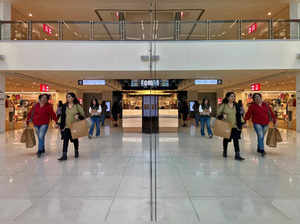 Reuters
ReutersDelivery of essential services led the chart in FY23 and was followed by cyber security and unfair trade practices. And so, the companies with the highest number of complaints are utilities such as Vodafone Idea, Dish TV, Reliance Infrastructure, Tata Power and Hathway Cable. According to Vodafone Idea's FY23 annual report, the company adheres to Trai policy of grievance redress and provides multiple channels for customers to raise complaints and feedback.
SBI tops the list of companies that have received the highest number of cyber security complaints, Axis Bank leads the list of companies receiving the most number of unfair trade practices-related consumer complaints and SBI Cards and Payment Services received the most number of complaints related to advertising.
Incidentally, 630 of the 1,000 companies reported receiving no consumer complaints across any of the specified categories of the BRSR. These include several large companies such as Apollo Hospitals, Asian Paints, Tata Motors, Vedanta and Sun Pharma. There is also disparity in the reporting of consumer complaints across industries.
"Until there is clarity and context on the definitions such as who is a consumer for a particular industry, whether the complaints are substantiated or not, and what is the process for redressing consumer complaints, just the metric of the number of consumer complaints is not comparable across companies," said Santosh Jayaram, global head of sustainability, HCL Tech.
Consumer activist Jehangir Gai said: "While the redress mechanism looks lovely on paper, the real test lies in the actual redress of the complaints of the consumer rather than the methodology of lodging complaints. It has become increasingly frustrating for consumers to get their complaints solved."
"Companies either outsource the complaints redress mechanism to third parties, which makes it difficult for the problems of the consumer to reach them, or they use technologies such as chatbots that lead to stereotypical and mechanical responses with the consumer left craving for a human interaction. Besides, the overall increase in employee attrition in companies also leads to lack of continuity in consumer redressal mechanisms,", he added.
(Catch all the Business News, Breaking News, Budget 2024 Events and Latest News Updates on The Economic Times.)
Subscribe to The Economic Times Prime and read the ET ePaper online.
Read More News on
(Catch all the Business News, Breaking News, Budget 2024 Events and Latest News Updates on The Economic Times.)
Subscribe to The Economic Times Prime and read the ET ePaper online.









 Get Unlimited Access to The Economic Times
Get Unlimited Access to The Economic Times
